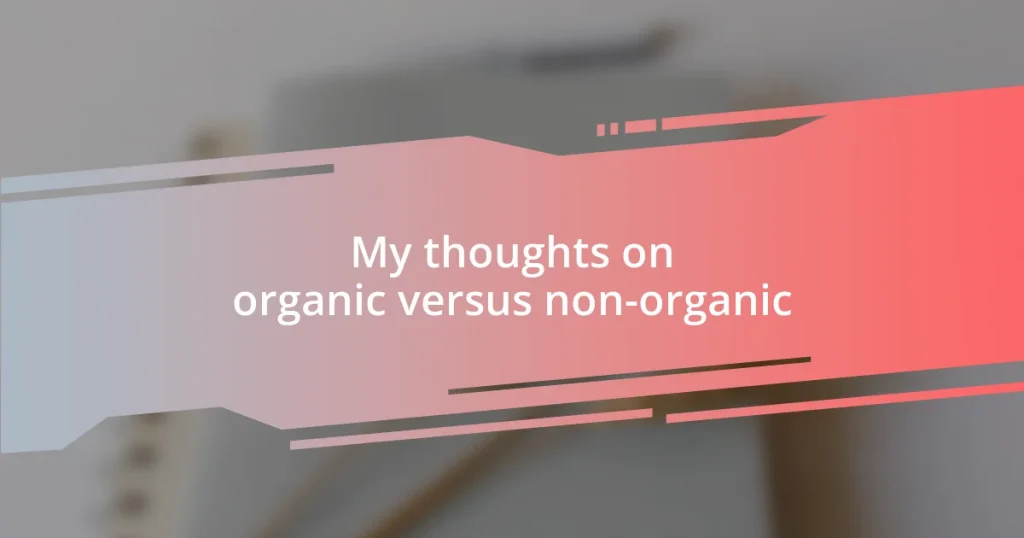Key takeaways:
- Organic farming avoids synthetic chemicals, promoting healthier food and more sustainable environmental practices.
- Choosing organic foods can lead to better nutrition, with higher antioxidant levels and fewer chemical residues.
- Engaging with local farmers and understanding product labels empowers consumers to make informed purchase decisions for their health and the environment.
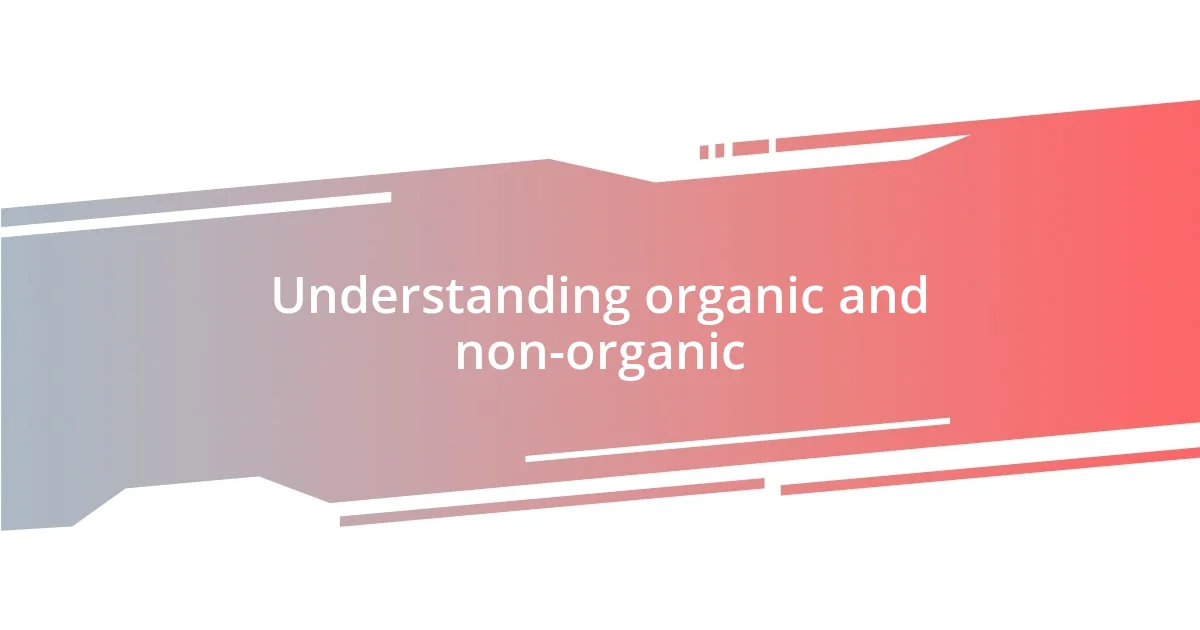
Understanding organic and non-organic
When I first encountered the terms “organic” and “non-organic,” I was surprised to learn that they represent much more than just farming methods. Organic produce is grown without synthetic fertilizers or pesticides, relying instead on natural processes to nourish the plants. It made me reflect: does the way we grow our food influence not just its taste, but also its impact on our health?
As I delved deeper, I realized that non-organic products often utilize chemical fertilizers and pesticides, which can leave residues on fruits and vegetables. I often wonder, how much do these chemicals really affect our bodies? There was a time I noticed I felt sluggish after a few weeks of consuming primarily non-organic foods, which prompted me to switch my diet.
The emotional connection I have with organic food stems from the idea of sustainability and supporting local farmers. When I buy organic, I feel like I’m making a conscious choice that benefits both my health and the environment. Isn’t it empowering to know that our food choices can make a difference?
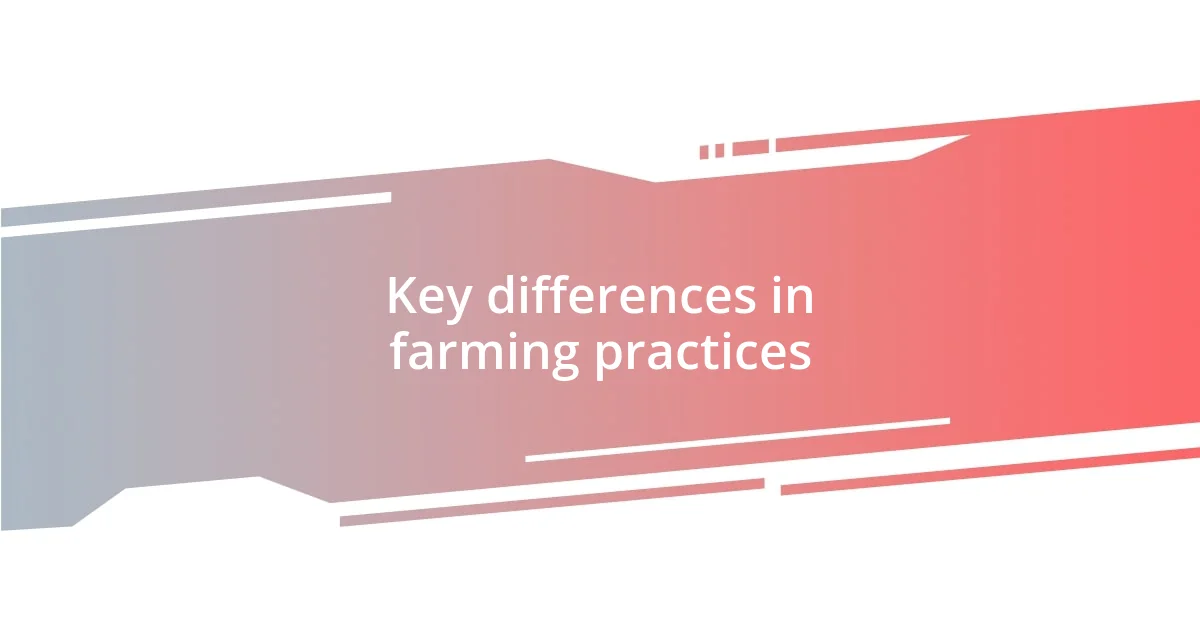
Key differences in farming practices
Organic and non-organic farming practices diverge significantly in their approaches to nurturing crops. From my observations, organic farmers prioritize ecological balance, often rotating crops and using compost or natural fertilizers. This method not only fosters soil health but also encourages biodiversity, which I find vital for a thriving ecosystem. In contrast, non-organic farming typically relies heavily on chemical inputs, which raises flags in my mind about long-term sustainability.
-
Organic farming practices involve:
- Natural pest control methods, like beneficial insects or traps, rather than synthetic pesticides.
- Crop rotation and polyculture to maintain soil fertility and reduce diseases.
- Certification processes that require adherence to strict organic standards.
-
Non-organic farming practices encompass:
- The use of chemical fertilizers to boost immediate crop yields.
- Routine applications of synthetic pesticides, often leading to pest resistance.
- Monoculture, or growing a single crop type repeatedly, which can deplete soil nutrients over time.
I’ve often found myself at farmers’ markets, drawn to the vibrant colors of organic produce. There’s something undeniably fulfilling about knowing my choices encourage sustainable farming practices. That sense of connection drives my preference for organic; it feels less like shopping and more like supporting a community dedicated to our planet’s health.
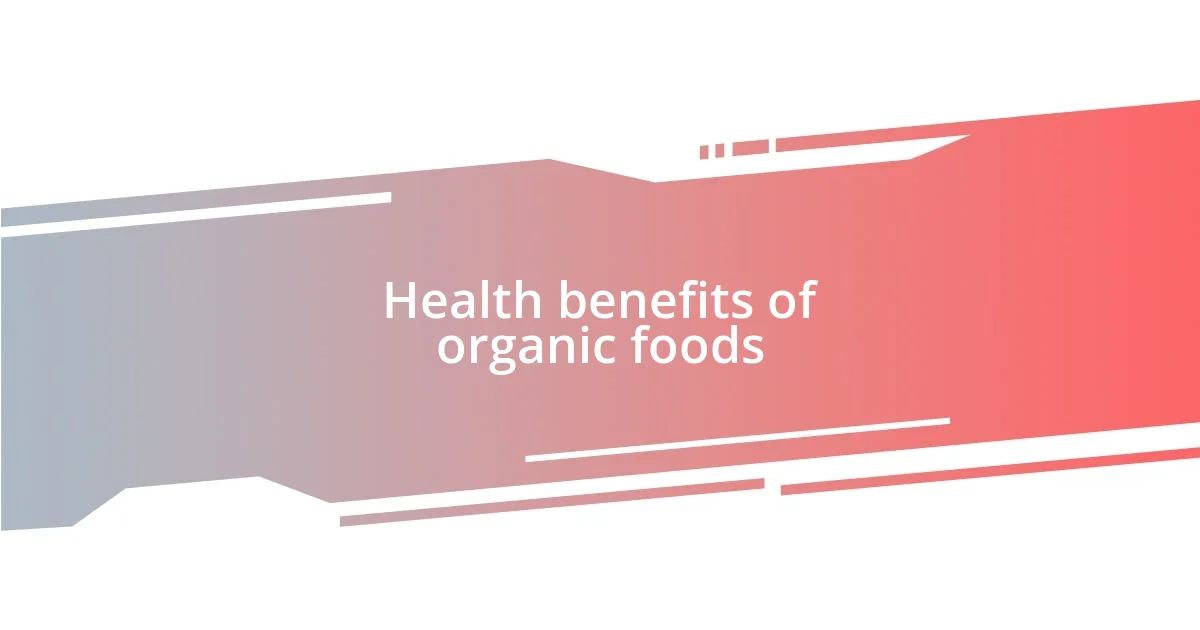
Health benefits of organic foods
The health benefits of organic foods are incredibly compelling. When I made the switch to organic, I noticed a significant difference in how I felt overall. For example, after a week of eating organic fruits and vegetables, there was a noticeable lift in my energy levels. It’s as if my body was thanking me for choosing foods that are free from harmful chemicals. This shift made me reflect on how our body responds to what we consume—do we really want those synthetic residues lingering inside us?
Moreover, consuming organic foods often means enjoying higher nutrient levels. Studies suggest that organic produce can contain more antioxidants, vitamins, and minerals. When I had my first bite of an organic strawberry, its rich flavor was a revelation; I couldn’t help but wonder if that burst of sweetness was directly linked to the healthier growing practices. This personal experience has led me to believe that organic foods provide not only taste benefits but also nutritional advantages that are hard to ignore.
Another aspect that resonates with me is the commitment to health through organic choices. I recall reading about how organic farming avoids antibiotics and growth hormones often used in conventional livestock practices. This insight really struck me and solidified my decision to buy organic meat and dairy. Knowing that my food is raised without unnecessary additives gives me peace of mind. Does anyone else find themselves wrestling with this choice as well? I certainly do!
| Health Benefits | Organic Foods | Non-Organic Foods |
|---|---|---|
| Residue-Free | Minimal to no chemical residues | Potentially higher chemical residues |
| Nutrient Density | Higher in antioxidants and vitamins | Lower nutrient levels due to chemical farming |
| Healthier Livestock | No antibiotics or growth hormones | Possible use of antibiotics and hormones |
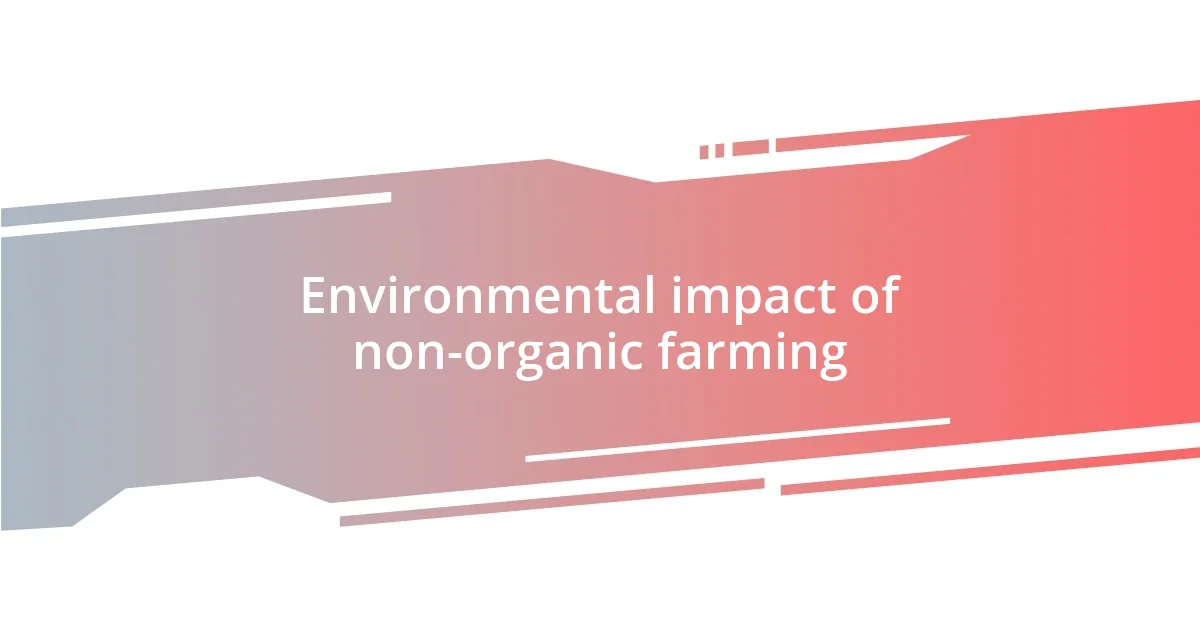
Environmental impact of non-organic farming
The environmental impact of non-organic farming is striking and often troubling. From what I’ve observed, the reliance on chemical fertilizers and pesticides can lead to soil degradation over time. Once, I visited a conventional farm and saw how the soil looked lifeless and dry, compared to the vibrant, rich earth in organic fields. It made me wonder: when did we stop nurturing the soil that feeds us?
Moreover, the use of synthetic pesticides doesn’t just affect the crops; it also has a ripple effect on local ecosystems. I recall watching a bee buzzing around my garden one afternoon, and it struck me how crucial these pollinators are for our food supply. With non-organic farming methods often linked to declining bee populations, I can’t help but question the long-term consequences of our farming choices. Is it really worth sacrificing our essential wildlife for short-term gains?
Another aspect that weighs on my mind is the water contamination risk associated with chemical runoff. I live near a river that’s vital for both wildlife and our community. It worries me to think that non-organic farming practices could compromise such an essential resource. When I learned about the negative effects of pesticide runoff on waterways, it felt like a personal call to action. How can we advocate for our environment while turning a blind eye to these pressing issues? It’s a challenge I believe we all can step up to tackle together.

Making informed purchase decisions
When it comes to making informed purchase decisions, I often find myself weighing the pros and cons of organic versus non-organic products. For example, I vividly remember standing in the produce aisle, glancing between the organic apples and their conventionally grown counterparts. The price difference was evident, yet the thought of pesticide residues lingering on those non-organic apples gave me pause. Isn’t it worth spending a little more for peace of mind and my family’s health?
I’ve also learned to check certifications and labels diligently. Initially, I didn’t pay much attention to the “USDA Organic” seal, but now, I see it as a key indicator of quality. That little stamp reassures me that the food I’m buying was produced under strict guidelines. Have you ever considered how much easier decision-making could be with a bit of knowledge? Just last week, I came across a loaf of bread labeled “natural” with no organic certification. A quick glance at the ingredients revealed it was loaded with additives. That experience reinforced the idea that being informed truly empowers our purchasing choices.
Lastly, engaging with local farmers at my community market has changed how I view my food sources. There’s something deeply reassuring about knowing where my food comes from and how it’s grown. During my last visit, I chatted with a farmer who passionately described his organic practices. It struck me: isn’t it essential to support those who prioritize sustainable methods? Hearing their stories not only helps me make informed decisions; it also fosters a sense of community that feels increasingly valuable in our fast-paced world.










